
Description
Vitamin K, also known as coagulation vitamin, belongs to a kind of vitamin and has the biological activity of phylloquinone. It was first discovered and extracted from animal liver and sesame oil by Danish chemist Dam in 1929. It was named "vitamin K" in 1934, which comes from the German word "Koagulation”. In 1939, Doyce from the United States extracted vitamin K and determined its chemical formula and structure. In 1943, they won the Nobel Prize in physiology and medicine.
Vitamin K includes K1, K2, K3, K4 and other forms, among which K1 and K2 exist naturally and belong to fat soluble vitamins, K3 and K4 are synthetic and water-soluble vitamins.
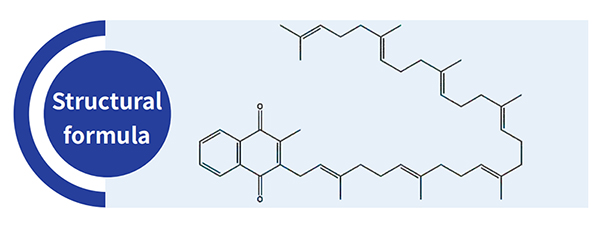
The chemical properties of the four kinds of vitamin K are relatively stable and acid and heat resistant. There is little loss in normal cooking, but they are sensitive to light and are easy to be decomposed by alkali and ultraviolet light.
Vitamin K2 (MK-7) is a type of vitamin K2, that is, seven isoprene units on the side chain of vitamin K2. It is a fat-soluble vitamin and one of the indispensable vitamins in the human body. It is also known as MK-7, menadione-7 and vitamin K2(35). CAS NO.2124-57-4, molecular formula C46H64O2, molecular weight 649.00.
Efficacy and Mechanism of Action
Coagulation activity
Vitamin K is an essential substance for the synthesis of four coagulation proteins (Prothrombin, Transformation accelerating factor, Anti hemophilia factor and Situ factor) in the liver, it plays an auxiliary role in the synthesis of γ- carboxyl glutamic acid.
If vitamin K is deficient, the above four coagulation factors synthesized by the liver are abnormal protein molecules, and the ability to catalyze coagulation will be greatly reduced.
Vitamin K2 has the same coagulation function and physiological function as vitamin K1. It can promote the liver to synthesize prothrombin (i.e., coagulation factor II) and regulate the synthesis of other three coagulation factors (factors VII, IX and X). Its coagulation mechanism acts as the coenzyme of Glutamic acid- γ- Carboxylase, which carboxylates the glutamic acid residue in prothrombin into γ- Carboxylated glutamic acid residues (Gamma-carboxyglutamate, abbreviated as GLA), thus, it has the ability to bind with Ca2+, connect the phospholipid surface and regulatory protein, and has coagulation activity. If Vitamin K is deficient, the synthesis of factors II, VII, IX and X will stay in the precursor state, and the prothrombin time is prolonged, which is easy to cause bleeding.
The National Health and Family Planning Commission of China has approved the fortification of vitamin K2 in milk powder prepared for children and pregnant women, which can avoid bleeding symptoms caused by incomplete development of coagulation system or vitamin K deficiency caused by dietary deficiency in children and newborns.
Effects on Bone Health
The effect of vitamin K2 on bone health has attracted more and more attention of scientists. A large number of clinical trials have proved that vitamin K2 supplementation has a positive effect on bone health. Bone Gla protein(abbreviated as BGP), Osteocalcin (abbreviated as OC), Matrix Gla Protein(abbreviated as MGP) and Protein S are the main Gla containing protein in calcified tissues. Vitamin K2, as a coenzyme of Glutamic acid- γ- Carboxylase, can carboxylate the glutamate residue on osteocalcin into Gla. After carboxylation, osteocalcin is activated. Gla binds and deposits with hydroxyapatite calcium to promote bone mineralization. If lacking of vitamin K2 in the body, it will lead to incomplete carboxylation of osteocalcin and the formation of undercarboxylated Osteocalcin (ucOC). The glutamic acid residues with incomplete carboxylation will affect the mineralization of bone. In recent years, the relationship between the carboxylation degree of osteocalcin and bone health has attracted extensive attention in the study of biochemical indexes of bone metabolism. UcOC content is directly proportional to osteoporosis and fracture probability, so ucOC can predict the occurrence of hip fracture. Serum ucOC increases with age, especially in early postmenopausal women. Vitamin K2 supplementation can reduce serum ucOC and fracture.
Prevention of Vascular Sclerosis
Matrix Gla protein (MGP) is a vitamin K-dependent Gla protein synthesized in cartilage and vascular wall cells. This protein is an important inhibitor of arterial calcification, and its activity depends on the γ- Glutamic acid carboxylation of vitamin K. The deficiency of vitamin K2 can lead to incomplete carboxylation of MGP (ucMGP), which leads to the loss of biological function of the protein. Non carboxylated MGP cannot effectively transport calcium ions in the blood, resulting in the increase of blood calcium concentration, resulting in the calcification of blood vessels.
Tumor Inhibition
Studies have shown that vitamin K2 has a positive effect on the inhibition of liver cancer. In multiple liver-cancer studies, vitamin K2 can reduce the recurrence rate of liver cancer and improve the survival rate of patients. The study also found that myeloma cells, leukemia cells and gastric adenocarcinoma cells are sensitive to vitamin K2. Vitamin K2 can effectively inhibit the growth of tumor cells, and inducing apoptosis is one of its important mechanisms. So far, no tumor inhibition effect of vitamin K1 has been reported.
New Discoveries in Alzheimer's Disease
Through the fruit fly experiment, researchers in the Northern Illinois University of the United States found that vitamin K2 can improve the electron transport in mitochondria, so it can restore the damaged mitochondria in cells to normal, and then promote energy production. This is expected to solve the interference of cell mitochondria and electron transmission in patients with Alzheimer's disease and relieve the disease. There was no such finding for Vitamin K1.
Application of Relieving Peripheral Nerves
As a coenzyme, vitamin K can participate in the electron transport and redox process in cells and tissues, and has a gentle and relaxing effect on peripheral nerves and muscle tissues.
Regulatory Dosage and Usage
Table 3. Recommended limits and levels of vitamin K2 in the European Union
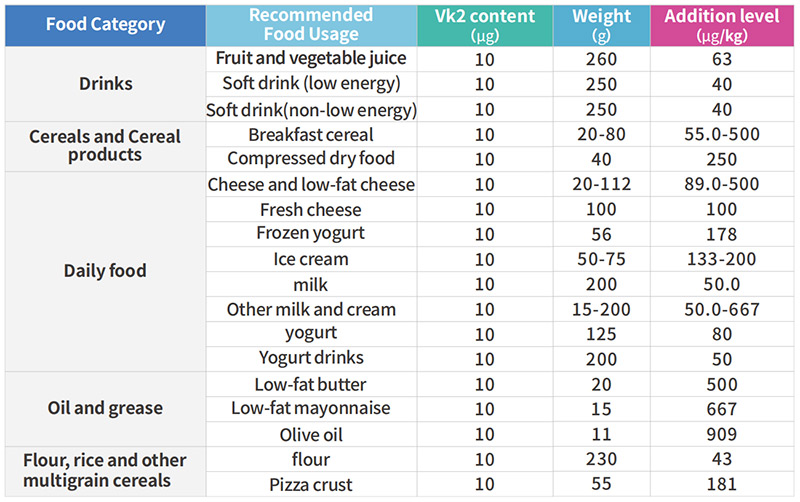
The daily adequate intake (AI) of vitamin K in the Dietary Guidelines for Chinese Residents 2016 is shown in Table 4 below:
Table 4. Adequate intake of Vitamin K for Chinese residents (AI)
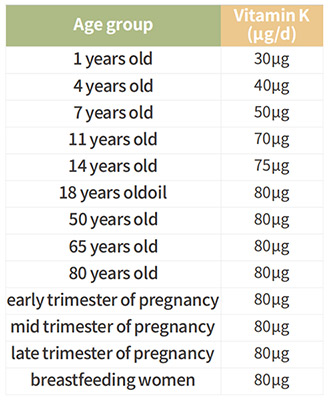
regulatory additive amount of USA
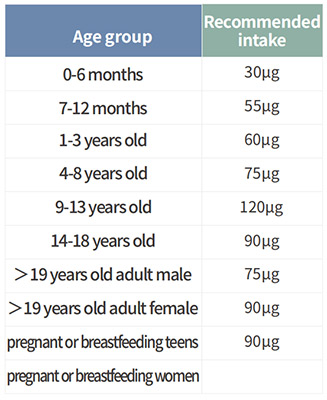
Product Specification
Powder
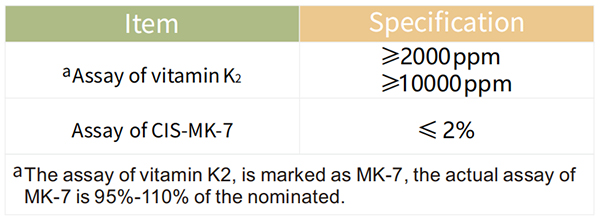
Oil
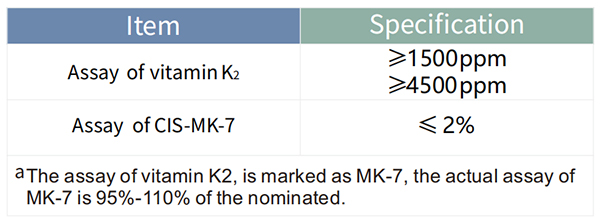
Production and Quality Control
Angel yeast Co., Ltd. was founded in 1986, specializing in the processing and manufacturing of yeast and yeast derivatives. Its production and marketing scale ranks first in Asia and third in the world. It has established a global marketing network, regional headquarters and application technology service centers in Beijing, Shanghai, Chengdu, Shenyang, Wuhan, Guangzhou, Cairo and other cities, and products are exported to more than 150 countries and regions.
Angel yeast Co., Ltd. has passed ISO9001 quality management system certification, HACCP certification, GMP certification and kosher certification, and the testing center has been recognized by CNAs, providing a reliable guarantee for the production of products.
MaiggicTM vitamin K2 (MK-7) is produced by Angel yeast Co., Ltd., entrusted by Hubei Magic
Health Technology Co., Ltd. Hubei Magic Health Technology Co., Ltd. has a series of internationally leading production and application technologies.
Package Specification
Inner: Aluminum Foil bag, Outer: Carton or paper bucket.
Inner bag aluminum foil packaging, outer carton or paper bucket, various specifications.

Shelf life:Store in cool,dry and dairy place, protect from light, with a shelf life of 24 months.

